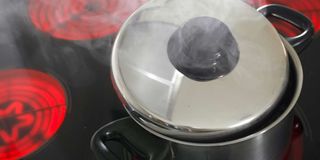Cook using electricity, Energy CS Keter urges households

What you need to know:
- The ministry of Energy says more demand will be key to reducing the overall unit cost of electricity.
The ministry is also pushing for more consumption in the agricultural sector through use of irrigation machinery.
Energy Cabinet Secretary Charles Keter is urging households to consider using electricity to cook as demand for power continues to drop due to the restrictions brought about by the Covid-19 pandemic.
The CS said modern electrical appliances have technical modifications that are energy efficient, making them inexpensive to use for cooking.
“Households should also utilise electricity for cooking especially with the more advanced energy efficient cookers and other appliances available,” Mr Keter wrote in response to queries over fall in power demand.
MORE CONSUMPTION
The ministry of Energy, which has been deepening power connection in rural areas under the scheme to connect all households by 2022, says more demand will be key to reducing the overall unit cost of electricity.
Consumers are forced to pay for all electricity contracted for generation under the Power Purchase Agreements with energy producers, leaving the burden of unused power on households hooked to the electricity mains.
The ministry is also pushing for more consumption in the agricultural sector through use of irrigation machinery which can be deployed during off-peak hours to help utilise the spilling hydro energy, vented geothermal steam or wind power.
CLEAN COOK STOVES
The ministry’s Clean Cook stoves survey conducted last year, however, revealed that only three percent of households own an electric cooking appliance such as mixed LPG-electricity stove, electric coil stove and microwave.
“This is largely attributed to the high cost of the stoves (the survey reported an average retail price for the mixed-LPG stove at Sh28,920 and Sh39,250 for urban and rural users respectively) and the cost of electricity,” said the study.
The survey released in November 2019 indicated that Kenyan kitchens still largely run on wood fuel (charcoal and firewood), ranking top as the most commonly used primary cooking fuel with 75 percent of Kenyan households reportedly using it.





